Efforts to focus international attention on the West Papua independence cause surged in the past week.
First, a petition claiming to represent the voices of 1.8 million West Papuans calling for decolonisation of Indonesian-ruled Papua was handed to the UN Human Rights Commissioner, Michelle Bachelet, in Geneva.
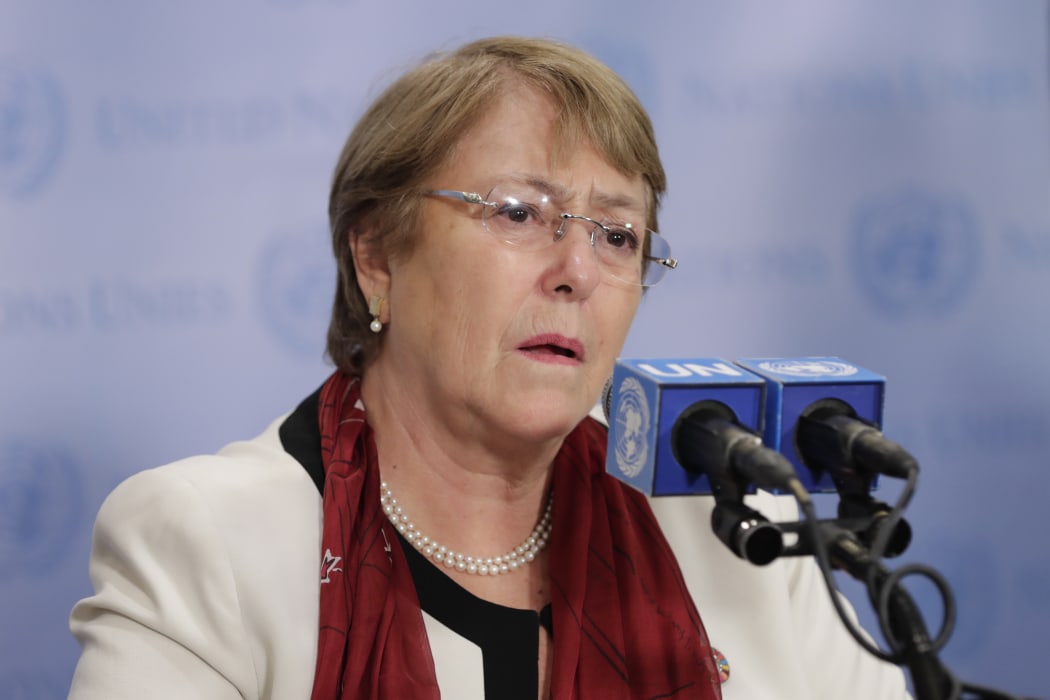
Photo: AFP / Luiz Rampelotto / NurPhoto
It was presented by the chair of the United Liberation Movement of West Papua (ULMWP), Benny Wenda, who was included in an official delegation of the Vanuatu government to a meeting with Ms Bachelet.
Then, the office of the commissioner confirmed that Indonesia had, in principle, agreed to grant her office access to Papua.
It represented a tentative breakthrough after the previous High Commissioner last year upset Jakarta by complaining that an invitation for his office to visit Papua hadn't been honoured.
Thirdly, representatives of the Free Papua Movement (OPM) and its armed wing, the West Papua Liberation Army, held a rare press conference in neighbouring Papua New Guinea where they re-asserted their war on the Indonesian state.
They made an urgent appeal to the UN secretary-general to ensure relevant UN agencies applied scrutiny to the human rights situation in Papua, and pressed their insistence that Indonesia has occupied Papua illegally.
At yesterday's event, they were joined by PNG civil society groups and two high-profile local MPs in calling for the international community to act on the "crisis" happening in the neighbouring territory.
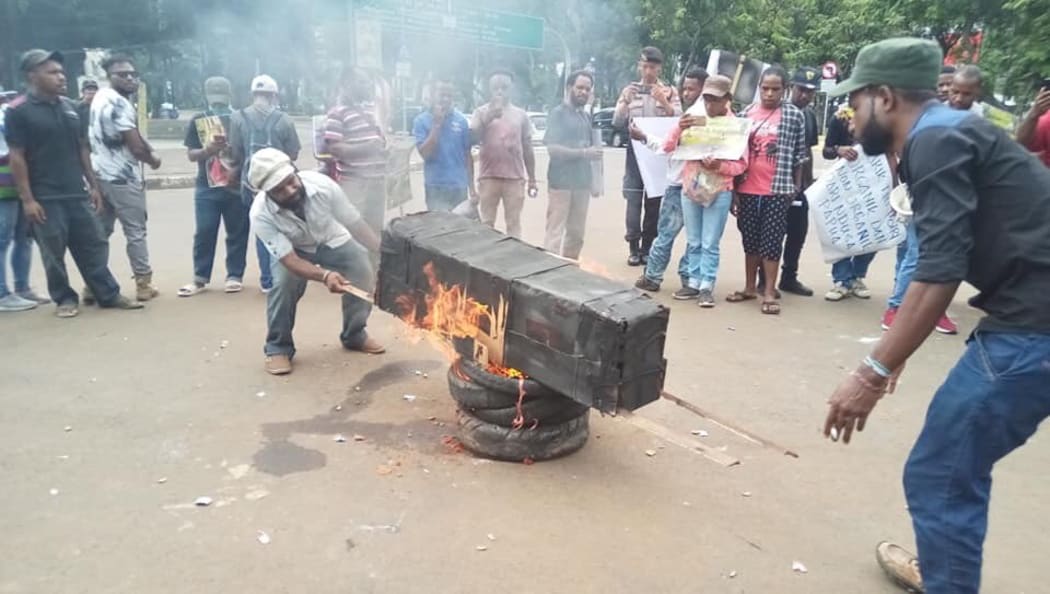
Papuan student protesters burning a coffin in Jakarta on 18 January, 2019. Photo: Twitter/Veronica Koman
Escalation
Nduga regency in Papua's central Highlands region is the current focal point of armed conflict between Indonesian security forces and the West Papua Liberation Army.
In the most serious escalation of hostilities for years, additional Indonesian military capabilities deployed to Nduga in December after the Liberation Army massacred 17 Indonesian road construction workers.
The Liberation Army was suspicious of Indonesian military involvement in President Joko Widodo's massive Trans-Papua road project.
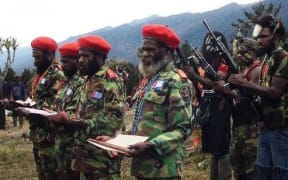
Highlands-based Defense Region Command of the West Papua National Liberation Army, or TPNPB. Photo: TPNPB
Given Papuan concerns about preserving their forests and ancestral lands, the project is viewed as a threat to many communities in the Highlands heartland.
Still, the president told media his resolve to forge ahead with his government's infrastructure development drive in Papua was all the stronger since the attack on the workers.
In her recent annual foreign policy review statement, Indonesia's Foreign Minister, Retno Marsudi, said her country would "not back down, not even an inch, when it comes to its sovereignty".
But with shootouts and killings continuing in Nduga and the surrounding region, humanitarian concerns are growing for thousands of Papuan villagers who have fled to the bush to avoid the violence.
Claims that chemical weapons have been used by Indonesia's military against civilians in Nduga have been vehemently denied by Indonesia.
The claims are just the latest reason cited by the ULMWP in its call for the international community, specifically the United Nations, to intervene in the Pacific's longest running conflict.
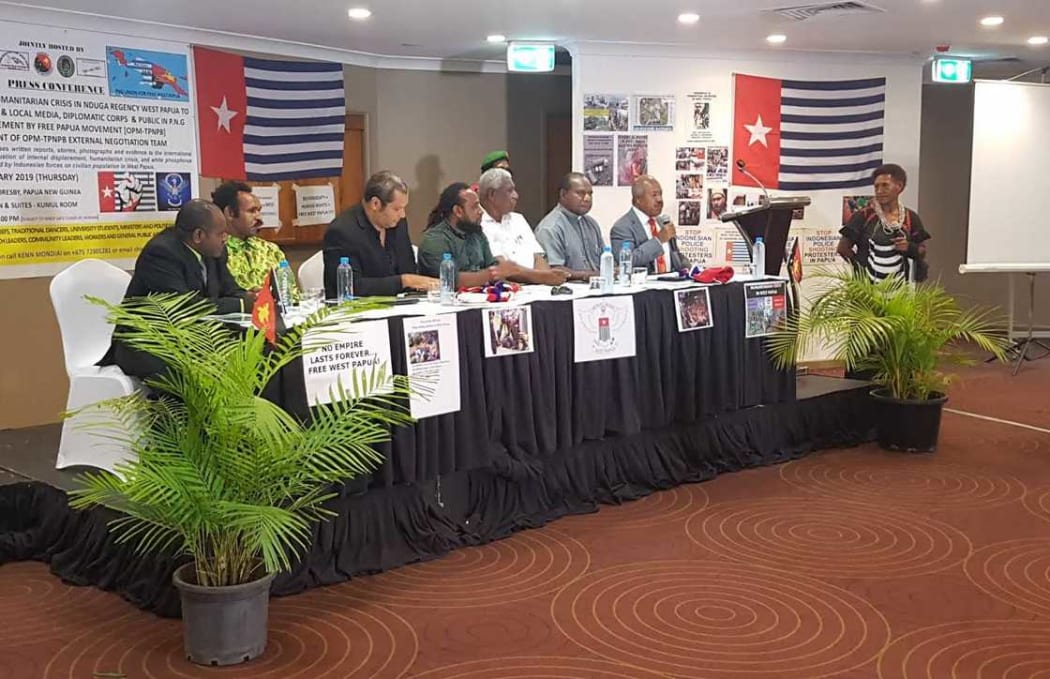
Governor of Papua New Guinea's National Capital Powes Parkop (with mic) speaks at OPM (Free Papua Movement) press conference in Port Moresby 31 January 2019 Photo: Supplied
Moresby rumblings
With concern about conflict in Papua running deep among Melanesian countries, Papua New Guinea's Peter O'Neill-led government is under pressure to act on the issue.
The Governor of PNG's National Capital District, Powes Parkop, announced at Thursday's OPM press conference that he was working on introducing a motion in parliament for a change in government policy on Papua.
According to the Oro Governor, Gary Juffa, the 1986 treaty with Indonesia, which commits PNG to not interfere in domestic matters of its neighbour, is outdated and must be changed.
"And it has to be done by parliament, because it was enacted by parliament," Mr Juffa said.
"And that's the whole purpose of this gathering. But it is also their statement that no matter what, there's no going back for them. Their only statement to the Indonesian government is that 'we are willing to negotiate for freedom, nothing else'."
Invoking the current urgency around the independence movement, the Oro Governor said West Papuans were determined and deserved the support of their neighbours.
"As Melanesians, as a Pacific nation, we have to rise up and stand up for our fellow Pacific Islanders."
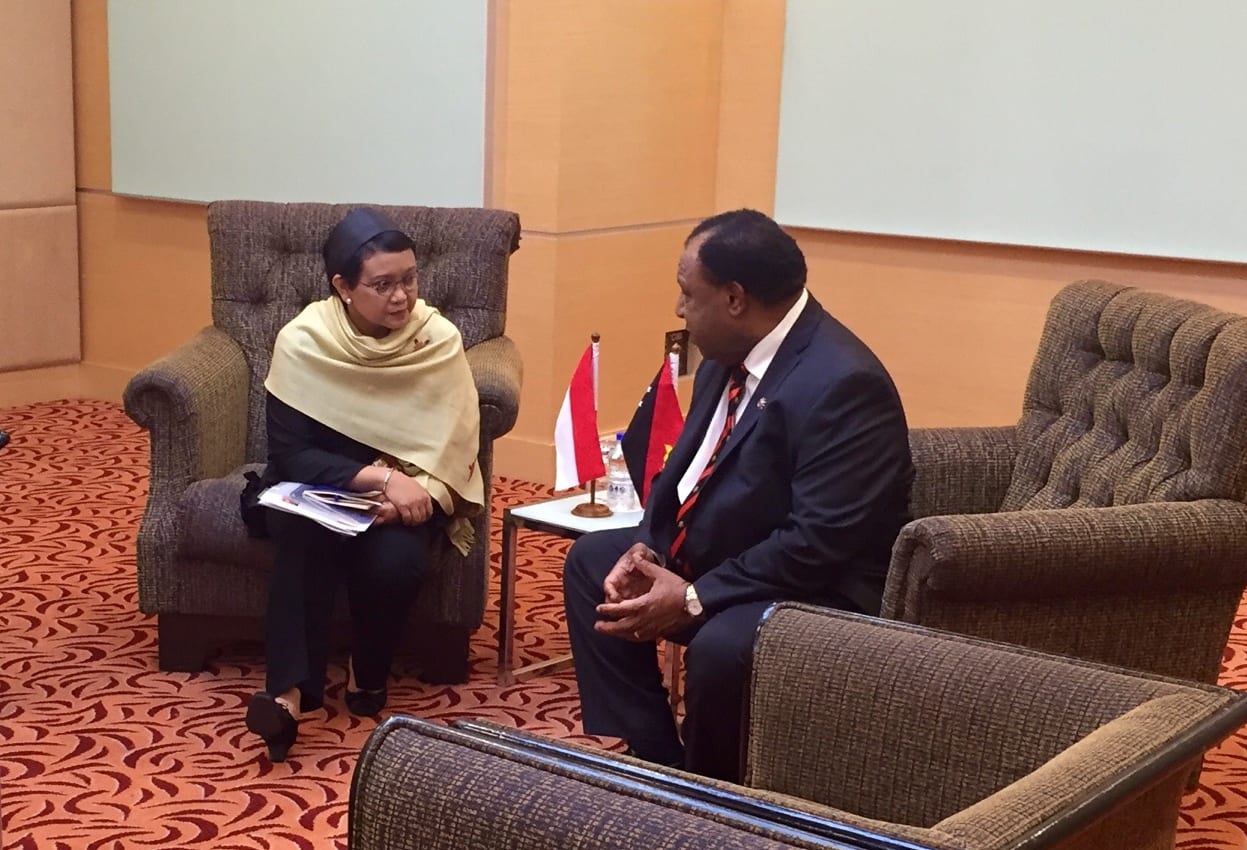
PNG Foreign Minister Rimbink Pato (right) talking to his Indonesian counterpart Retno Marsudi. Photo: Supplied
However PNG's Minister of Foreign Affairs, Rimbink Pato, has repeatedly ruled out PNG pushing Indonesia on the matter of Papua's political status.
He recently said PNG was working with Indonesia on various projects in the common border area that he claimed would help foster economic development and steadily improve living conditions for West Papuans.
But chair of PNG's Union For Free West Papua, Ken Mondiai, said the issue of West Papua should be addressed by the UN.
"Indonesia has come in in a very forceful way since the 1960s to take over using its military force. The United States of America, the UN, the Netherlands, and many of the big countries like Australia are collectively responsible. So they should be responsible to try and fix the mistakes of the past."
Diplomatic surge
At the Moresby press conference, an OPM spokesman, Jeffrey Bomanak, announced the Movement's official support for the Liberation Army's declaration of war against the Indonesian state.
He said its armed struggle to end Indonesian rule would not cease until Jakarta agreed to meet for peaceful negotiations, for which the OPM is establishing a negotiating team.
However, Indonesia's government has previously ruled out negotiations with the OPM, which it brands as a criminal group, and is unlikely to change its stance now.
Indonesia's Political, Legal and Security Minister Wiranto recently told media that the government would not enter any discussions with the Army.
But apart from Indonesia, those involved in this intractable conflict are looking to the UN to help resolve the problem.
According to Mr Wenda, while the OPM and Liberation Army are united in support of his Liberation Movement's international efforts, he cannot control them.
"We cannot control the guerillas in the West Papuan bush, who face the threat of torture and death by the colonial Indonesian military every day," he explained.
"The guerillas have their own command structure and their own leadership, and due to geographical, logistical and communicative difficulties we do not try to direct them. The ULMWP is focused relentlessly on its goal of achieving international support for an internationally-supervised vote on independence for West Papua."
On that front, Mr Wenda's delivery of the petition in Geneva last Friday was described by Indonesia as a 'manipulation'.
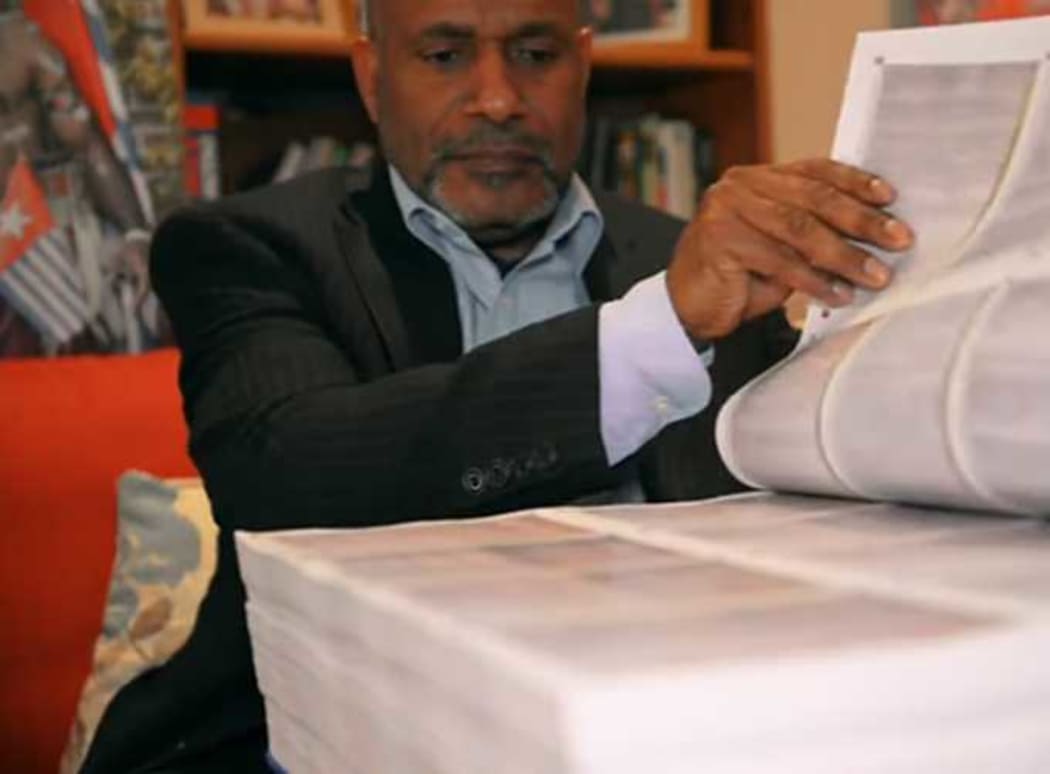
The chairman of the United Liberation Movement for West Papua, Benny Wenda, peruses the petition calling for West Papuan decolonisation. Photo: Benny Wenda FB
Indonesia's permanent representative at the UN, Hasan Kleib, alleged that Mr Wenda has infiltrated the Vanuatu delegation.
He added that Vanuatu was disrespectful and had broken the principles of the UN charter by allowing Mr Wenda to deliver the petition.
But Vanuatu's Foreign Minister, Ralph Regenvanu, said his government had always maintained its support for the self-determination of West Papuans.
Vanuatu continues to advocate for the UN to revisit the controversial process by which Indonesia took control of the former Dutch New Guinea in the 1960s.
Indonesian officials, who say the question of sovereignty over Papua is final, delivered their own shot at Vanuatu this week in Geneva where the Melanesian country was undergoing its universal periodic review at the UN Human Rights Council.
However, this week it was mainly the Papuans who made the diplomatic running.

